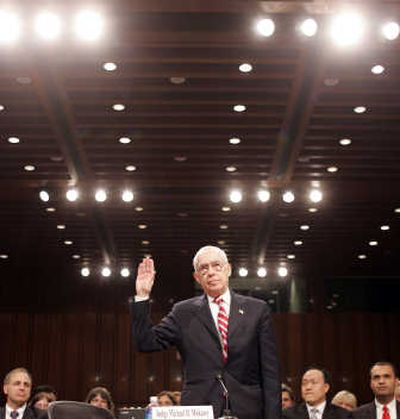Mukasey renounces torture of suspects

WASHINGTON – Former federal judge Michael Mukasey, President Bush’s nominee for attorney general, on Wednesday repudiated the use of torture in the interrogation of overseas terrorism suspects, and he vowed to keep partisan politics out of the Justice Department’s decision-making.
Mukasey’s remarks during the first day of his confirmation hearings demonstrated how he differs from his predecessor, Alberto Gonzales, who refused to condemn controversial interrogation techniques and resigned amid accusations that he allowed politics to taint the department.
The comments also pleased Mukasey’s supporters, who see him as a moderate replacement capable of repairing the Justice Department’s reputation.
Mukasey, however, side- stepped questions about other anti-terrorism initiatives and signaled that his views mesh significantly with the administration’s.
Mukasey, an 18-year veteran of the federal bench, reassured administration critics that he’d review the department’s hiring and firing practices and limit contact between politicians and high-level employees to address concerns that the department has been compromised by political considerations.
In what appeared to be a departure from Gonzales, Mukasey also condemned a 2002 memo written by then-Assistant Attorney General Jay Bybee and backed by Gonzales as “worse than a sin.”
“It was a mistake,” he told the Senate Judiciary Committee. “It was unnecessary.”
The memo concluded that the president could authorize policies that violated international and U.S. laws banning torture. A presidential executive order later set new limits on interrogation, but continued to allow harsh treatment that critics charge is tantamount to torture.
“But beyond all of those legal restrictions, we don’t torture – not simply because it’s against this or that law or against this or that treaty,” Mukasey said. “It’s not what this country is about. It is not what this country stands for. It’s antithetical to everything this country stands for.”
Nonetheless, Mukasey made clear that he wasn’t prepared to push for dramatic changes in several of the administration’s initiatives.
While acknowledging that the Guantanamo Bay detention center had given the United States “a black eye,” he said he didn’t believe the detainees there had been mistreated. He also declined to call for its immediate closure.
President Bush has pledged to close Guantanamo eventually, and he has accelerated the release of detainees. However, the administration hasn’t resolved how to handle so-called “high-value” suspects.
“I can’t simply say we have to close Guantanamo, because obviously the question then arises, what we do with the people who are there,” Mukasey said. “And there is now no easy solution to that.”
Mukasey also said he had to refrain from offering his opinion on the current interrogation policy until he heard more details. Civil libertarians said the policy could still allow for harsh treatment such as waterboarding, an interrogation technique that calls for pouring water over a prisoner’s face to trigger a gag reflex and fear of drowning.
“I can’t say that there’s something that’s out of line with the law in those programs until I see the programs and see the memos,” Mukasey said.
Mukasey’s equivocation on such crucial issues didn’t appear to faze Senate committee members.
Mukasey is said to be all but confirmed after key Democrats, including Senate Judiciary Chairman Patrick Leahy, D-Vt., indicated that they would back him. Democrats were largely won over by his reputation as a Washington outsider capable of remaining independent from the White House.
Mukasey’s warm reception by the Senate contrasted with the contentious hearings Gonzales faced before being confirmed in January 2005. Sen. Charles Schumer, D-N.Y., and Sen. Joseph Lieberman, a Connecticut independent who caucuses with Democrats, heaped praise on the current presidential nominee, describing Mukasey as fair and honest, while predicting that they would at times disagree with him. Republicans were equally positive about Mukasey and urged Democrats to confirm him quickly.
The hearings are scheduled to resume today.
Mukasey, a Reagan appointee to the bench, presided over the 1995 trial of Sheik Omar Abdel Rahman, whom he sentenced to life in prison for his role in a plot to blow up New York landmarks.
Before his appointment to the bench in the Southern District of New York, Mukasey, 66, was a federal prosecutor and headed the district’s anti-corruption unit. Despite a close friendship with Republican presidential hopeful Rudy Giuliani, Mukasey’s supporters said he doesn’t owe his nomination to political connections.
“This is a man of the law, not a man of politics,” Lieberman said.
Some Democrats, however, said they remained troubled by some of his views on civil liberties and the administration’s expansive interpretation of presidential war powers. Critics also have accused Mukasey of dismissing constitutional concerns raised about anti-terrorism laws passed in the wake of the Sept. 11, 2001, terrorist attacks.
Sen. Russell Feingold, D-Wis., took issue with comments Mukasey made during a speech that the Patriot Act had “become the focus of a good deal of hysteria, some of it reflexive, much of it recreational.”
“You’ve been very critical, Judge, and even dismissive, on occasions, of people who raise concerns about the Patriot Act,” Feingold said.
While Mukasey didn’t back down from his assertions, he acknowledged that sections of the Patriot Act might need to be amended.
“I certainly don’t think that any federal judge of whom I was aware who dealt with any issue under the Patriot Act was engaging in recreational hysteria,” he said. “What I had in mind were people who used it as a shorthand for everything that terrified them.”